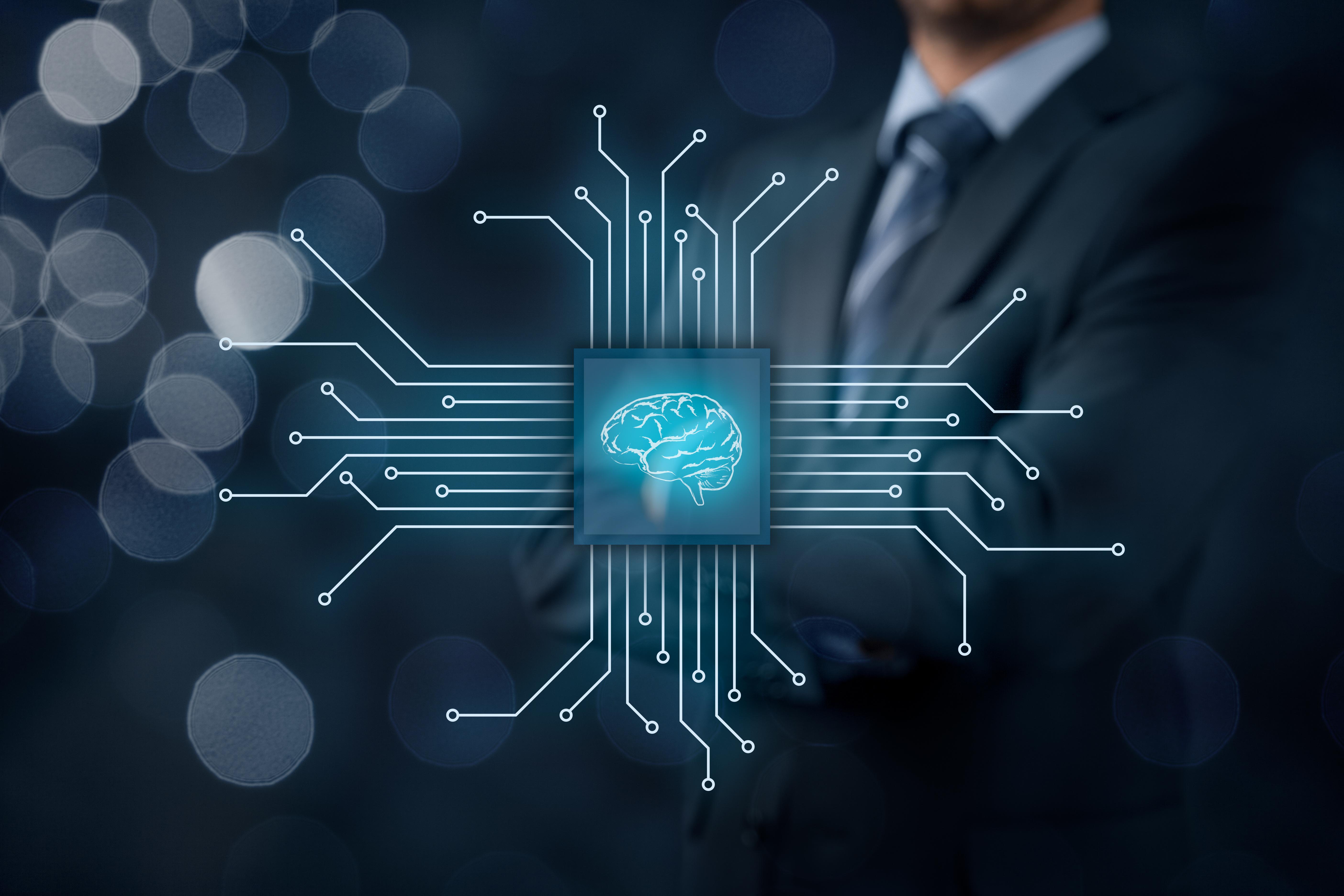




Global Indonesia Professionals’ Association (GIPA) aims to promote business and investment links overseas through highly talented Indonesian professionals and executives – a true partner for Indonesia’s economic diplomacy and human capital development
GIPA represents Indonesian professionals and executives in nine key industries across G20 and ASEAN, encompassing 80% of the world’s GDP and 60% of the world’s population The nine key industries represented are: (1) Financial Services, (2) Technology, (3) Professional Services, (4) Healthcare and Life Sciences, (5) Industrials, Products, and Logistics, (6) Public Sector and International Organisations, (7) Energy, Resources, and Utility, (8) Creative, Communication, and Media, and (9)
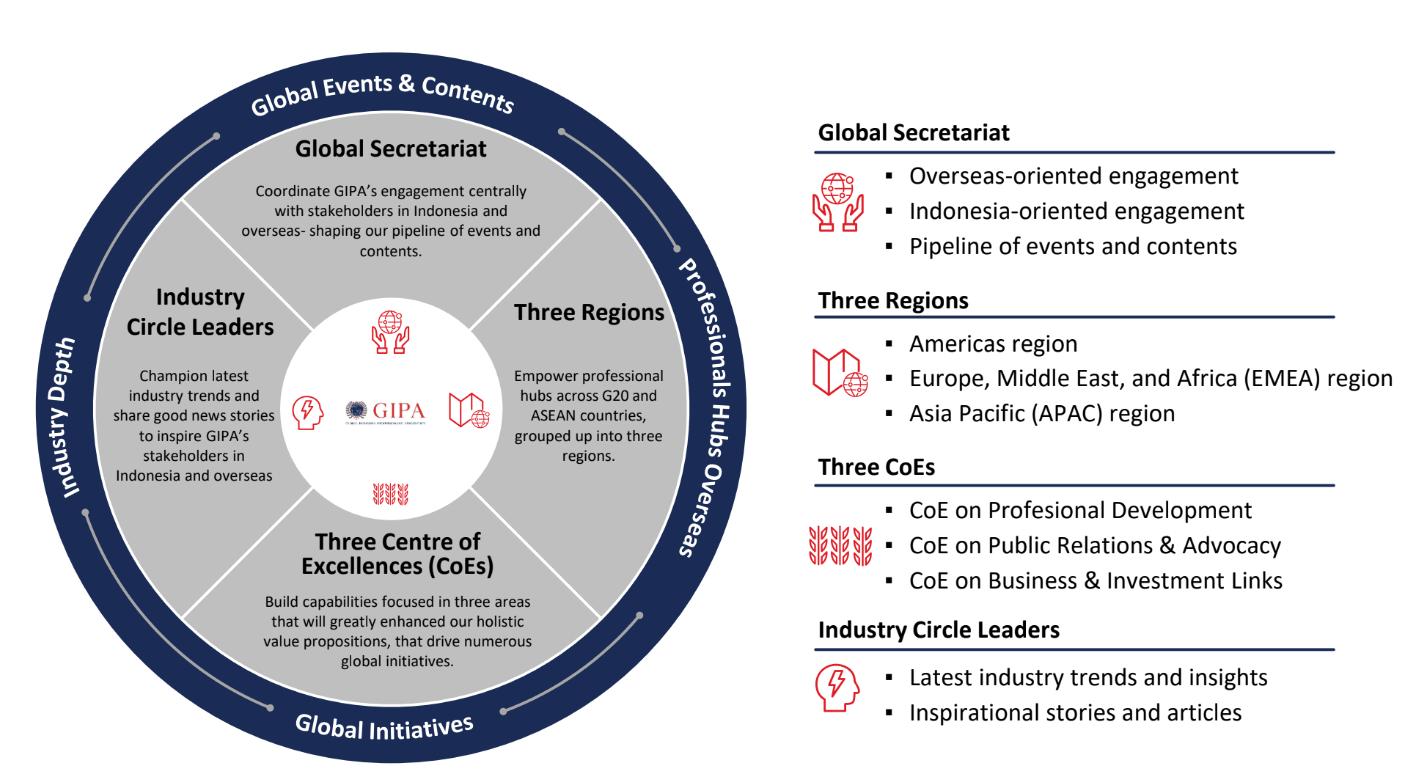
GIPA champions three Centers of Excellence (CoE) on Professional Development, Public Relations and Advocacy (PRA), and Business and Investment Links
Going Global Series (GGS) focuses on market-relevant career insights and personal experiences to encourage Indonesians overseas and back home to go global for their professional careers Working in a global environment and obtaining international work exposure has been an interest for both Indonesian students overseas and in Indonesia. GGS aims to inspire more Indonesians to kick start their journeys of becoming the next global leaders, as part of GIPA's drive to further Indonesia's human capital development from abroad
October 2020's GGS event aims to inspire Indonesian students and graduates abroad to reimagine their career trajectories through a global lens. In this event, we invited Indonesian professionals working in Microsoft, Google, and Citi, based in the US and Singapore
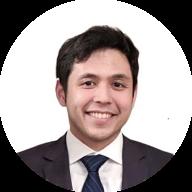


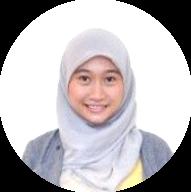
This event is proudly supported by Ministry of Research and Technology of the Republic of Indonesia (RISTEK-BRIN), Embassy of Indonesia in DC, Indonesian Professionals Association (IPA) USA and Singapore, as well as PPI Dunia.
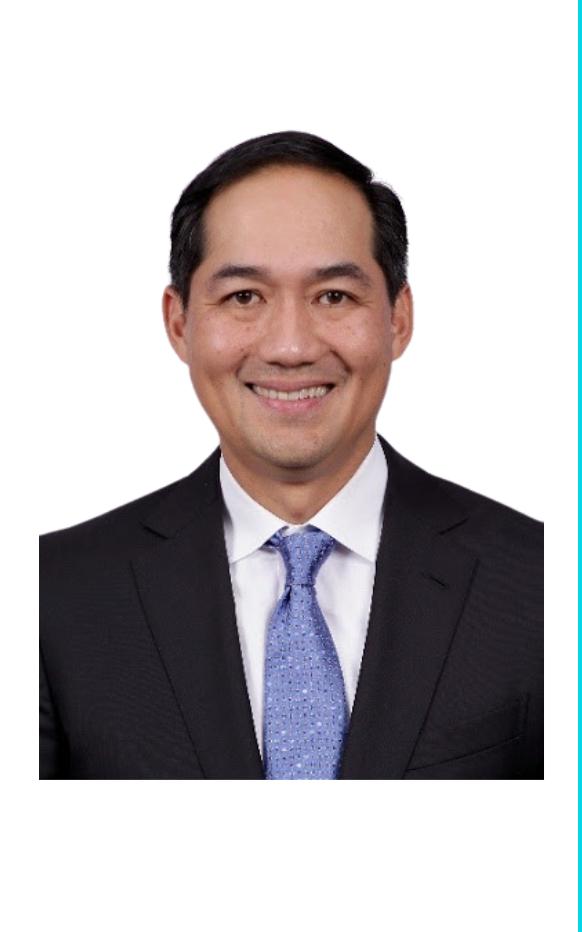
OPENING REMARKS
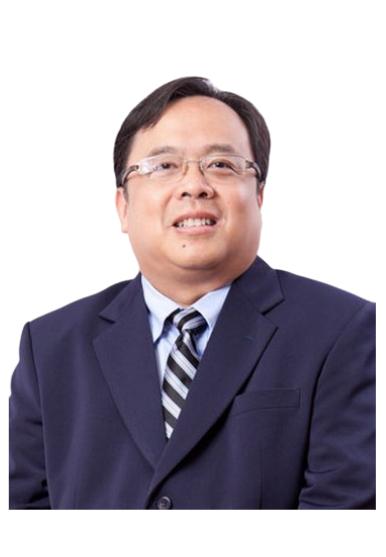


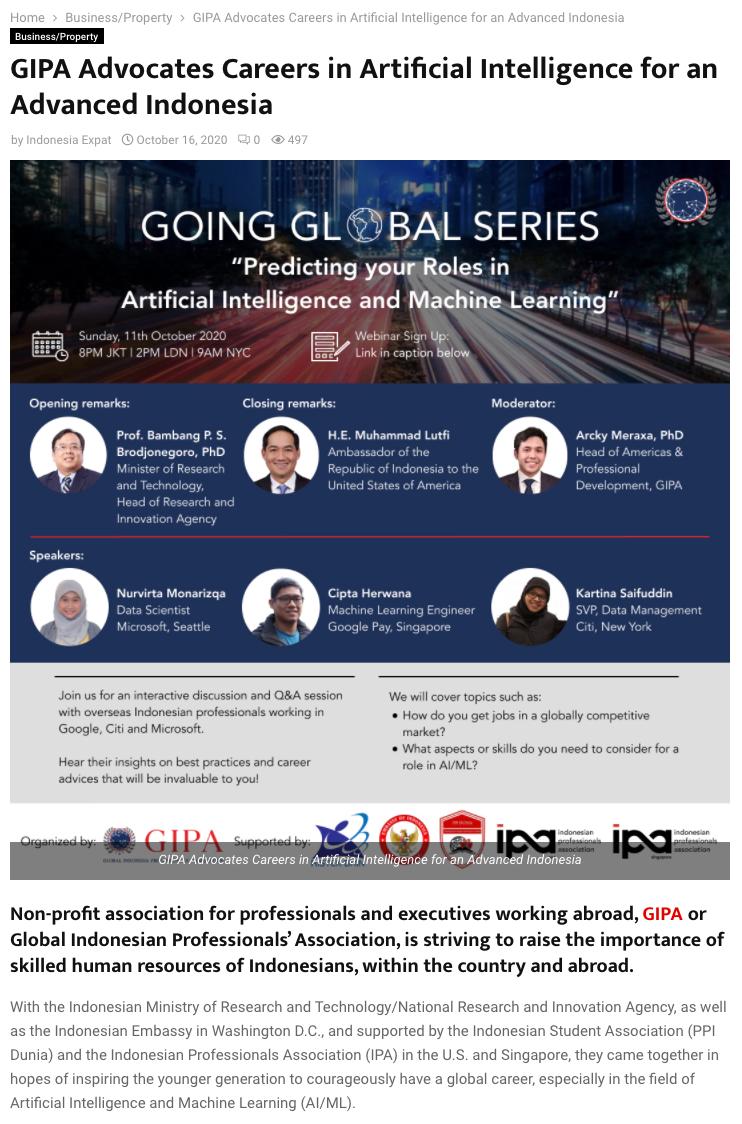
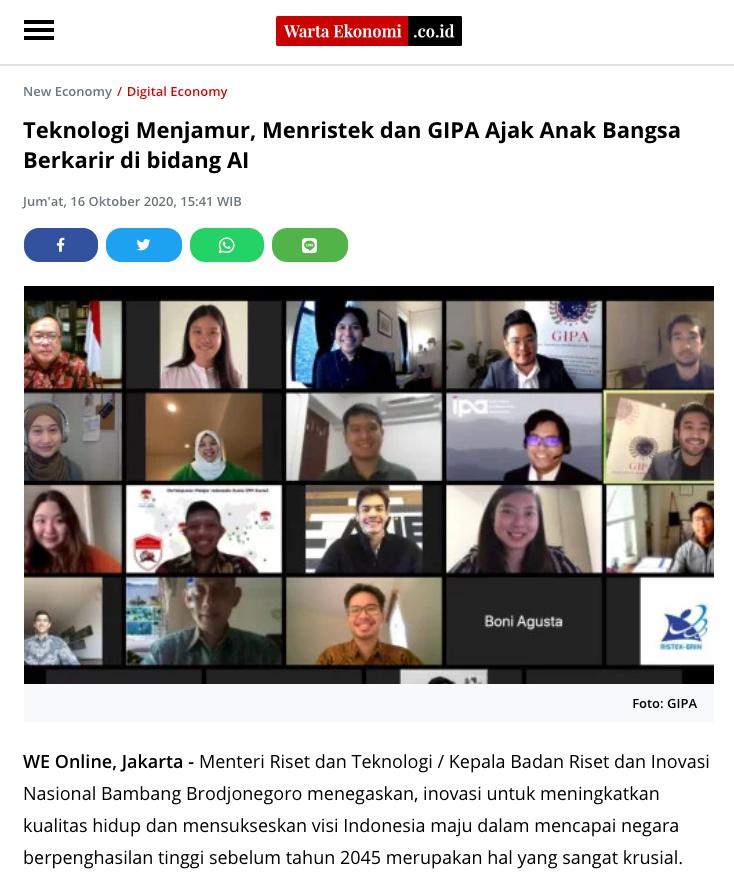


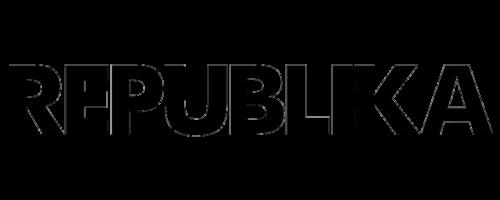




Currently, we are facing various potential and challenges, such as industrial revolution 4 0 and the COVID-19 pandemic This condition has provided opportunities for all parties to strive harder in carrying out research and innovation to come up with the solution Innovation, through an innovation-driven economy paradigm, is the key towards Indonesia's vision to be a high income country in 2045. Therefore in this era, we are required to promote technological innovation for the prosperity of humankind and to contribute to economic development
Ministry of Research and Technology, National Research and Innovation Agency acts as the integrator by formulating policies in order to create a conducive innovation ecosystem. To create this ecosystem we invite the collaboration of "Triple Helix" which is government, academician or researchers, and industry Our duty is to coordinate and conduct efforts on research, development, systematic
Prof. Bambang P.S. Brodjonegoro, PhD Minister of Research and Technology, Head of National Research and Innovation Agency
review, and implementation of innovations. Indonesia's priorities in research and technology, are elaborated in 2017-2045 National Research Masterplan to streamline the country's long term R&D needs It covers 4 main aspects which are (1) appropriate technology, (2) value added and commercialisation, (2) import substitution and local content, and (4) frontier technology
The development of Artificial Intelligence technology in Indonesia consists of several programme such as (1) providing share infrastructure and platform for Artificial Intelligence and Machine Learning through mapping and standardising interconnected scheme between private communication infrastructure public and strategy IoT (Internet of Things), (2) researching on the concept of random token or application of share infrastructure, (3) developing Indonesian national artificial intelligence supercomputer center In addition, we also plan to establish the Artificial Intelligence console as an arbitrator between producers and consumers data. The five priorities of our artificial intelligence national strategy are (1) medical services, (2) bureaucratic reformation, (3) education and research, (4) food security, and (5) mobility and smart cities Thus, in the process, the presence of professionals working in the technology sectors are strongly needed for conducting the National Research Priorities, the handling of COVID-19 pandemic, and most importantly in Artificial Intelligence National Strategy to realize the digital transformation in Indonesia which is an important factor to shift measures economic paradigm from resource-driven economy to innovation-driven economy.
Prof Bambang P S Brodjonegoro, PhD also encourages Indonesians to take career in Science, Technology, Engineering, and Mathematics (STEM), as Indonesia's economic structure will shift into innovation-based in the future The expertise of STEM-enthusiasts in Indonesia are urgently needed now, more than ever They will become enablers to create many more innovations in the future and to overcome modern challenges.
The expertise of Indonesian professionals in STEM is urgently needed, more than ever*
A study by OECD shows that a middle income countries since 1969 cannot skip the middle income trap when the demographic bonus is ended. With that calculations, Indonesia demographic bonus bonus should end between 2038 - 2040 This demographic bonus means that a lot more young people than the elder generations So basically we have to triple our GDP from around $4000 today into triple by 2038 in order to skip this middle income trap. In order to skip from this middle income trap, Indonesia has to do two things: (1) investing in infrastructure and (2) transfer of technology and innovations, these two will propel us into tripling our GDP and skip the middle income trap
We also have to see the pillars of our growth, from President Jokowi's speech during his campaign in 2019, we heard that he wants Indonesia to

be #4 economically in the world in 2045 which is 100 years after Indonesian independence, and then during his inauguration he says that enriches should be number five economically in the world - that means that Indonesian GDP per capita will be around $23,000 I would like to see Indonesia to have a very aggressive and very good trajectory of growth, around 6 4%, so Indonesia can skip the middle income trap by 2032, and Indonesia will be able to achieve the #4 in the world economic target
One of the way to achieve this is to industrialize Innovation and technology is a very important part of Indonesia's development into graduating from the middle income trap. It is a challenge that Indonesia needs to address, sometimes it is very easy to say - but it is not easy to execute In order to have those, Indonesia needs to also develop its society and workforce If you see today, Indonesian high school diploma only amounted around 30% of its workforce in 2045 this number has to change 90% of our workforce has to graduate from high school, but today only 30% from Indonesian workforce has a college degree. This has to turn to 60% in the future. Right now, 25 million kids entered into first grade but only 15 million graduate from high school because we don't have the capacity. We need to have good, qualified teachers in order to teach our kids With this COVID-19 pandemic, suddenly we realise that Indonesia needs to revolutionize how to teach Indonesian kids With this digital platform, I think Indonesia would have a very good education system based on technology based on digital and this is something we should embrace in the future
I'm expecting that the Indonesian professionals, Indonesian student associations across the world, can find good technology in education [and healthcare system], which will propel Indonesia into a good trajectory of growth Hopefully with new talents and better-equipped generations, Indonesia can escape the middle income trap, recover from COVID-19, graduate from middle income into developed country before 2038 I pray to God that with digital technology, we can have a lot of discussions and solutions, and I'm expecting this young generations of Indonesians to be part of the solutions.
With digital technology, young generations of Indonesians, students and professional h ll b part of the solutions to our challenges*
Mona is a Data Scientist at Microsoft based in Redmond, Washington but currently works from her small one bedroom apartment in Bellevue, Washington She’s currently focusing on cybersecurity, creating models to detect ransomware attacks, but she has worked in different domains such as marketing and urban planning, all as a Data Scientist She started her career as a remote Data Scientist in a startup, SaleStock Indonesia (also known as Sorabel, now closed permanently), then went to Grad School in NYU (New York University) and landed a job in Arcadis, a Civil Engineering firm, also as a remote Data Scientist Her clients are usually cities or other US government agencies, so she has flown all over the US to meet them Tired of being on the road and a remote worker, she applied for jobs in the Washington area and ended up getting an offer from Microsoft However, the pandemic hits and now she’s once again, working remotely as a Data Scientist In her free time, she enjoys hiking in the Pacific Northwest area or just doing nothing at her home

Since I moved to the US, I have experienced being a stay-at-home wife, an entrepreneur (had an online shop), a student, and now an office worker Every single role has its own challenges so it’s never fair to compare them all, especially us as a women One of my findings is now a local law in New York City
Since I was in high school, I love investigating, stalking, and collecting data to come up with my own conclusion It continued till college, my thesis was a “data science” thesis; I did sentiment analysis using Twitter to predict the winner of the 2014 presidential election Then, my then-boyfriend nowhusband got a job in the US so initially I just followed him here However, I still love doing data so I ended up going to online courses, taking a remote job, and went to Grad School, where I finally got my internship as a Data Scientist I was not good back then but I was blessed with the right opportunity at the right time, best colleagues and mentors so I can grow fast and be here now
Cipta has experienced the full spectrum of software engineering during his 7-year tenure at Google, from frontend development, highly available systems serving billions of ads per day, and everything in between He graduated from Columbia University with a Bachelor’s degree in computer science specializing in Machine Learning Prior to Google, he worked at FactSet Research Systems as a software engineer on the Events & Transcripts platform
After completing a Master’s program in Data Science from NYU in 2018, Cipta relocated to Google Singapore to join the Google Pay team as a ML-focused SWE. Currently he’s serving a role as tech lead for a team that builds smart experiences in the GPay app using data science and machine learning He enjoys cooking and learning to play the guitar in his free time

As an INFP and being too used to dealing with software rather than people, it’s still a challenge to put myself out there and make my team’s work visible to others It takes practice, and what helps is reframing it as a service/duty to your team members so their hard work and skills can be appreciated by the organization as a whole.
A few years back I had a couple medical issues which affected my career What I learned through the experience is the importance of taking charge of your own well-being as well as having a strong support system around you Knowing when and who to ask for help is important, but ultimately you are the one who’s responsible for your own growth.
My interest in software began by finding a tutorial book for Visual Basic in my dad’s bookshelf when I was in elementary school In college, I switched majors from Electrical Engineering to Computer Science after helping a friend with CS homework and realizing I have a talent for it I was introduced to Machine Learning in college and was instantly hooked, but it would take a while before I can actually land a role doing that
I’ve been in various engineering teams in Google and was naturally drawn towards the more dataheavy parts of the stack After finishing my part-time Data Science Master’s, I started looking for data/ML roles in Singapore (I was also wanting to reunite with my long-distance girlfriend, now fiancée). By luck, a team doing just that was getting headcount in Singapore, and I applied for a transfer They liked my experience and qualifications, and the rest is history
Kartina (Wina) has been in the financial industry for 9 5 years She is a Senior Data Management Lead Analyst at Citigroup focusing on strategic data acquisition planning and data delivery automation In the last two years, she led teams in building tools to automate data collection, creating reports, and correlating data to identify actionable items She is actively contributing in serving and satisfying global regulatory demands, such as Current Expected Credit Loss (CECL). In addition to that, she devotes her time in leadership initiatives within Citi.
She loves spending time with her husband and two kids, continuously educating herself about the Big Data world When time permits, she likes to bake and take afternoon walks

What’s not on your profile and CV that you would like to share?
I was a Teaching Assistant for several courses during my undergraduate studies in Math UI. The reason I took this position was because I needed it to reverse the glossophobia in me I was always a shy person It gave me jitters when I had to speak in public I purposely challenged myself in taking these TA positions, so that I can teach, think, and present in front of a class confidently and become comfortable with being the center of attention
How did you get to where you are today?
Education - My undergraduate was in statistics/actuarial math that I completed from FMIPA UI and graduate studies from UB This opened many doors into the workforce in Indonesia and the US Aside from the complex theory, pure mathematics knowledge, my math background helped me in identifying patterns more effectively and efficiently. It also taught me how to break up problems into key components and find an approach to solve these problems.
Mentorship - I am one of the lucky ones because throughout my career, I was able to find a mentor in almost every critical phase there is and this happened organically Looking back, I have to say the most significant contribution came from mentorship I gained back when I was an MT in Indonesia It was my first job, out of college, no corporate experience, but there was a lot of learning.
Hard work - nothing great will come without hard work And let's be honest, especially for us, immigrants The saying that we will need to work twice or thrice harder to get the same outcome in career progression or senior management role and its exposure is true But don’t let that hinder your spirit Take it as a challenge and motivation to win We have a competitive hardware, sometimes it's our own mind that prohibits our growth and confidence to move forward and lead.
Opportunity - I always believe that the more you try, more opportunities will come to you So, don’t fear rejection, see it as a chance to fix any mistake (if there is) and a passage for an opportunity that is about to come
A combination of consulting, research, coding (SQL or any scripting language), and technical understanding of how different ML algorithms work
One needs to understand how to formulate a problem, get and prepare the data, pick the best method to tackle certain problems (the solutions may be simple and far away from fancy), and then how to communicate them
properly to the stakeholders You also need to be able to collaborate with others and gain insights from them.
Familiarity with analysis and prototyping tools like Python, Colab is a requirement You also need to be able to answer quickly “is this project feasible given the data we have, the engineering bandwidth, the product requirements?”
In the Financial Industry, when dealing with big data, particularly when supporting the business, Python and R are the 2 most common languages used Wina's first exposure to R was during her graduate class in economic forecasting, she then took extra training in R from Datacamp in addition to
learning these skills as you go on the job
You could also use Kaggle which offers a lot of example problems/datasets in data science or ML People post examples of notebooks of their solutions Practice makes perfect
The interview process is broken up into two categories: Leadership traits and Technical or "brain teaser" questions
Leadership
Every company has their own leadership standards and the interview questions are usually in line with those To get better insights, one can check the prospective company ' s website to see the type of talents they want to attract Prepare stories or experience to showcase those value in your interview. Typical questions include: "How do you deal with difficult clients?",
"What kind of manager do you like working with", or "Tell me about a time where you are working on a project that went successful and a project that failed"
Technical
Brain teaser question such as, "How do you explain how YouTube works to an 85 year old?", "Teach me how to make an omelette," or more specific questions such as, "How do you do data import in R?", "Here are a few cases, which packages work best to solve those problems?"
"For me, life is like playing baseball What we need is that one home-run, but in order to get that one home-run, we need to swing the bat a thousand times That applies for getting a job in a top company, dream company, whatever you call it I remember submitting my resume hundreds times There were times where I didn’t hear anything for months but funnily enough, once a company sent me an interview invitation, others were like “ we need you too”
From one hundred-ish resume I submitted, I got phone interviews probably 10 times and then 4 onsites and one offer. Any “online” job application will be hard by default because thousands of people apply for that one job I think what made me hit my “home-run” was when I tried to tailor my
resume to the job description. I finally beat the algorithm and moved forward. And portofolio! Data scientists are stalkers by nature so if they find out you have portofolio, that’s usually a plus and differentiate you from anybody else "
Nurvirta Monarizqa"Sometimes it takes patience to land your dream job, then your dream role in your dream job And your views and interests may change along the way Networking and people skills is important, even in very technical roles Always strive to develop your-selves, try to break out of complacency " Cipta Herwana
"I tried to gain as much professional experience as I can, as early as possible. Before getting a job at Citi, I worked for a little over a year in an Insurance company in Indonesia as a Management Trainee Then I came to the US to pursue my master’s degree During this time, I get to meet and network with people from various backgrounds Starting from a colleague who happens to own a company and offered an internship position in his company This builds not only my professional skills but also professional referral
I read a lot of books about leadership and professional development. This boosted my confidence and morale when entering the job market They ended up helping me during my interview process with Citi I leveraged my network and mentoring opportunities - you never know where that relationship will take you! Landing such job is hard because the nature of the job force today is very competitive and it changes rapidly too; what you learned in school from 7 or 8 years ago can easily become obsolete In the financial industry, in particular, since the financial crisis and now with COVID-19, we need to be smart and think about what is unique about us and combine it with the skills that we have, in order to stand out amongst other applicants "
Kartina SaifuddinKnow your personal brand
This will require contemplation, reading, talking to people about the career path or industry that you are interested in And then summarize those information to become what you want people to think or how you want people to view you
Willing to go beyond the task even though it is not part of your job description
The way to show this is to come prepared during the interview with several stories that highlights how you went above and beyond Either it’s a story from the projects that you worked on in school, or when you helped your professor with the class Having these stories ready will show
Communication has to be stronginterpersonal skill needs to be balanced; especially if you ’ re coming from a technical background The key is storytelling Think from the perspective of your audience and tailor the messaging accordingly. In America
the interviewer that you did your homework before the interview happened, it will showcase your leadership skills, and how well you will fit in the team and company
Expand your knowledge about the industry and big data, including the challenges and potential solutions
The goal with this approach is to slightly shift the conversation from an interview into a dialogue Show that you are passionate about this role One suggestion by attending webinars/conferences Example, Tableau Conferences, they have this regularly through webinars, and it's free
(and maybe American Tech), listeners like it if you start with the conclusion and recommendation first, then go back to provide justification and data Focus on different things for different people
No one hustles harder than New Yorkers On time and professional But funnily enough, I rarely work overtime like what I heard a lot from my Jakartans friend When it’s the time to work, we work, and at 6 pm we go home.
Sometimes we hangout with our co-workers but not to the point that we go to dinner everyday I heard that in Jakarta, we got a lot of “insights, ideas, concerns ” in the after hours That’s not the case here If I have to argue with my boss, I will argue in the meeting until we come up with a conclusion. No hard feeling
There is also IC/managerial track for a career here in the US Some startups in Indonesia that I know implement this as well, but probably not all of the companies IC helps me move forward with my career without having to manage people and that aligns so much with my introverted personality
Nurvirta MonarizqaI see that in the US, one ’ s professional progression is not really about seniority but more of meritocracy. It’s more about the work, the achievements, and exposure to key people that will help you climb the career ladder. And that is acceptable by the employee
When you work in a multinational company, you tend to have diversity, either in the employees or clients, which encourages ideas exchange, regardless the level I learned that no matter how introverted you are, there will be a point in time where you need to speak up otherwise you will be left out in the discussion.
Indonesian or Asian culture in general has the tendency to be reluctant in speaking in group meetings (formal or informal) While the discussion we have here (in the US) is very fast flowing Lack of confidence Saying sorry too much - these are samples where I see culturally it is acceptable professionally in Indonesia but not in the US So, one tip from me on how to survive this is “when in Rome, do as the Romans do ” It can be challenging but it can be done First step is to be aware such differences exist and formulate a plan to move away from habits that hinder your career progression.
Kartina SaifuddinSince COVID-19, financial industries are forced to move to digitization in order to strive/grow. So, there are even more opportunities for data science, AI, and ML for business
Decentralized workforce, harder to get a large group to have a shared vision
In Singapore specifically, government has mandated widespread contact tracing methods (with apps and/or Bluetooth tokens) This raises questions regarding data privacy as well - think of the data generated by that system and its implications on privacy
Many companies freeze their hiring process because they are still waiting to see what the future will look like BUT it does not mean there is no chance As always, with human nature, having the resilience, we will get through this situation and new opportunities will gradually spring again
While we go through this, use your time to meet new people, have a think of what areas that you are passionate about. Because work
becomes more enjoyable when you love or like what you are doing
Think about the future, 5 years from now, what areas do you see will start to emerge with increased demand for talent. And start setting up goals to reach that destination In principle, supply demand in the labor force will always remain, if there is short supply and high demand for a certain skill set, companies will look for you regardless of borders.
Is a degree in data science compulsory to be able to work in AI? Where do we start? How did you start your data science learning journey?
Not necessarily - only one of our speakers actually did Data Science as a degree! While the other did Urban Informatics and economics You can start by taking online courses such as those in Coursera, Datacamp, and Udemy.
Are means such as online courses certification and coding bootcamp enough to break into the industry?
Yes! Coursera, Datacamp, or Udemy offers good courses for data science, AI and ML. It is actually enough to break into the industry. However, it is also important for you to network!
How to start building your portfolio after completing online courses?
Being able to showcase your analytics exercise or data science work online, such as through Github is always relevant
Does your university name play a big role in your job application process? How to leverage oneself if he/she doesn’t graduate from a prestigious university?
It helps with the campus recruitment process Specific companies have specific targeted universities However, ultimately it actually comes down to your work experience and skill set Remember the stepping stone method, it will be a very good way to slowly get yourself closer to major companies, while you begin in smaller ones
How do you improve business acumen on top of your technical AI/ML knowledge?
Start networking and building relationships with people from the industry While your data science and AI/ML skills will help to solve problems quantitatively, it’s always good to get insights from people on the field as well as ready business books or articles (e g , Harvard Business Review). Some problems requires qualitative inputs and field experience!
How should Indonesia approach the talent gap especially in AI/ML? What aspects can be improved both by the government and the talents themselves?
The Ministry of Communications and Informatics and five state universities in Indonesia launched the “Digital Talent Scholarship” which is an intensive training program dedicated towards technology literacy. You can find out more about it here: https://digitalent.kominfo.go.id/
Tech skills like coding for instance should also be taught early on to Indonesian students to ignite awareness and teach students active problem-solving. This can be done as a core curriculum or as an optional or extracurricular that the students can choose from
How to create AI-ready culture in your organization? How to promote data partnership between the public-private sector? How can the public-private sector partnership on AI benefit the society?
Microsoft has coined the “ADKAR Framework” - an acronym that refers to the five steps to take for an individual to achieve change: Awareness, Desire, Knowledge, Ability, Reinforcement This is one of the tools that can be used when aiming for any cultural transformation in an organization Microsoft’s AI Business School is also a good source to learn more about how to approach AI and the different strategies to enable such culture.
What are the challenges when building a robust/strong AI? How can we put enough safety measures to help ensure that the AI that we are developing is as all-inclusive / as fair as possible? Who should be responsible for this? The government? Or the enterprise that develops the AI?
To ensure that your AI/ML models are strong, you need to ensure that your data quality and features are strong, the model is conceptually sound, and the model is back tested to ensure that it is calibrated properly. To ensure fairness, and prevent biases, there are recent resources that can be leveraged, for example Christopher Molnar’s “interpretable AI” At the moment there is no specific regulatory guidance from the Government on AI/ML However, governments around the world are starting to consider including AI/ML as part of their regulations. If that’s the case, certainly companies will have to follow
How could AI and ML be regulated in Indonesia? Any specific takes on Health data? Government can issue a mandate for AI/ML regulations and practice Currently, no government have specific laws on AI, however, an interesting principles has been published recently by the government of Singapore
What do you think of the AI/ML’s disruptive change in the job market - as more and more jobs are being automated and replaced by AI, e.g. H*We that launched the first virtual news anchor? What would happen if all the primary industries already rely on AI? AI/ML will augment Jobs that could be automated would be automated or in other words, displaced by AI, but it will also change the way we work and what human workers will do! Experts and analysts at PwC, McKinsey, and more believe that AI will create a lineup of new jobs - producing at least 7 2 million jobs in the UK alone in the next 20 years There are certain skills that AI are not able to replicate such as interpersonal or social and emotional skills like empathy, intercultural sensitivity, and more
Can AI be applied in Disaster management, Accounting, Agriculture, Geographic Information System, Health, Government? How do you see these applications help these industries?
Yes, and they have been applied!
Disaster Management: Using seismic data, AI can analyze the magnitude and patterns of earthquakes; drones, sensors and robots have been developed to provide accurate information about damaged buildings and landscapes. In India, Google has also built AIs to predict floods and use Google Maps and Google Search to warn users - in September 2020 the technology has covered all of India and is expanding to Bangladesh
Agriculture: precision agriculture, detecting diseases and target weeds with certain herbicides
Geographic Information System: the method to examine vector diseases uses AI/ML approach, comparing to the nearest neighbouring countries or areas
Health: imaging, medical scan recognition and diagnosis, telehealth
Government: facial recognition on cameras, crowd analytics, traffic density prediction, behavioral analytics, even dialect classification
AI will help to augment existing processes by making it faster and more efficient


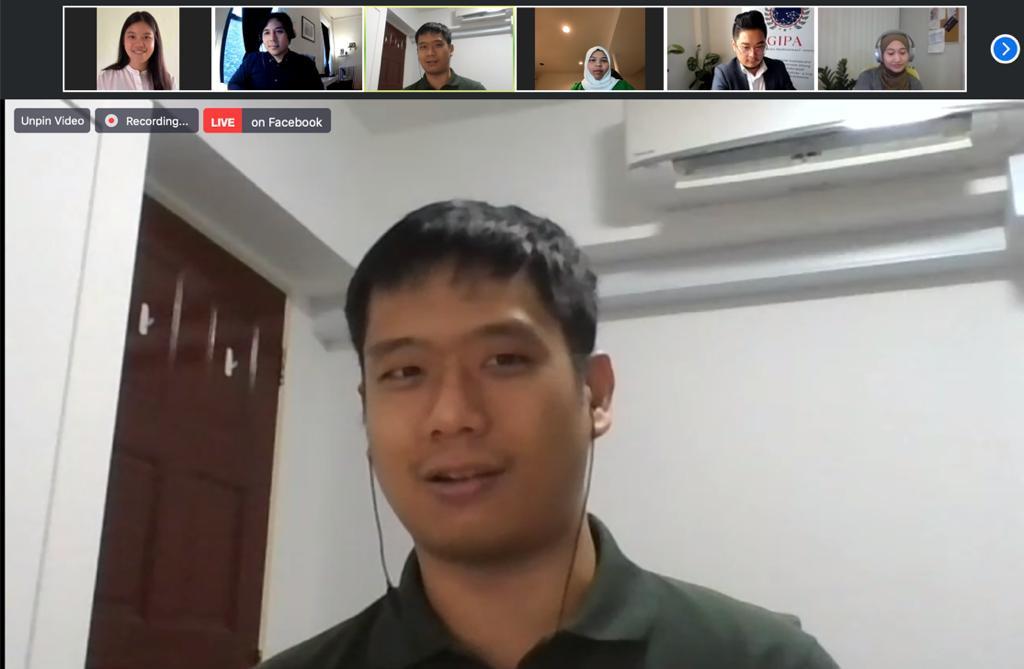



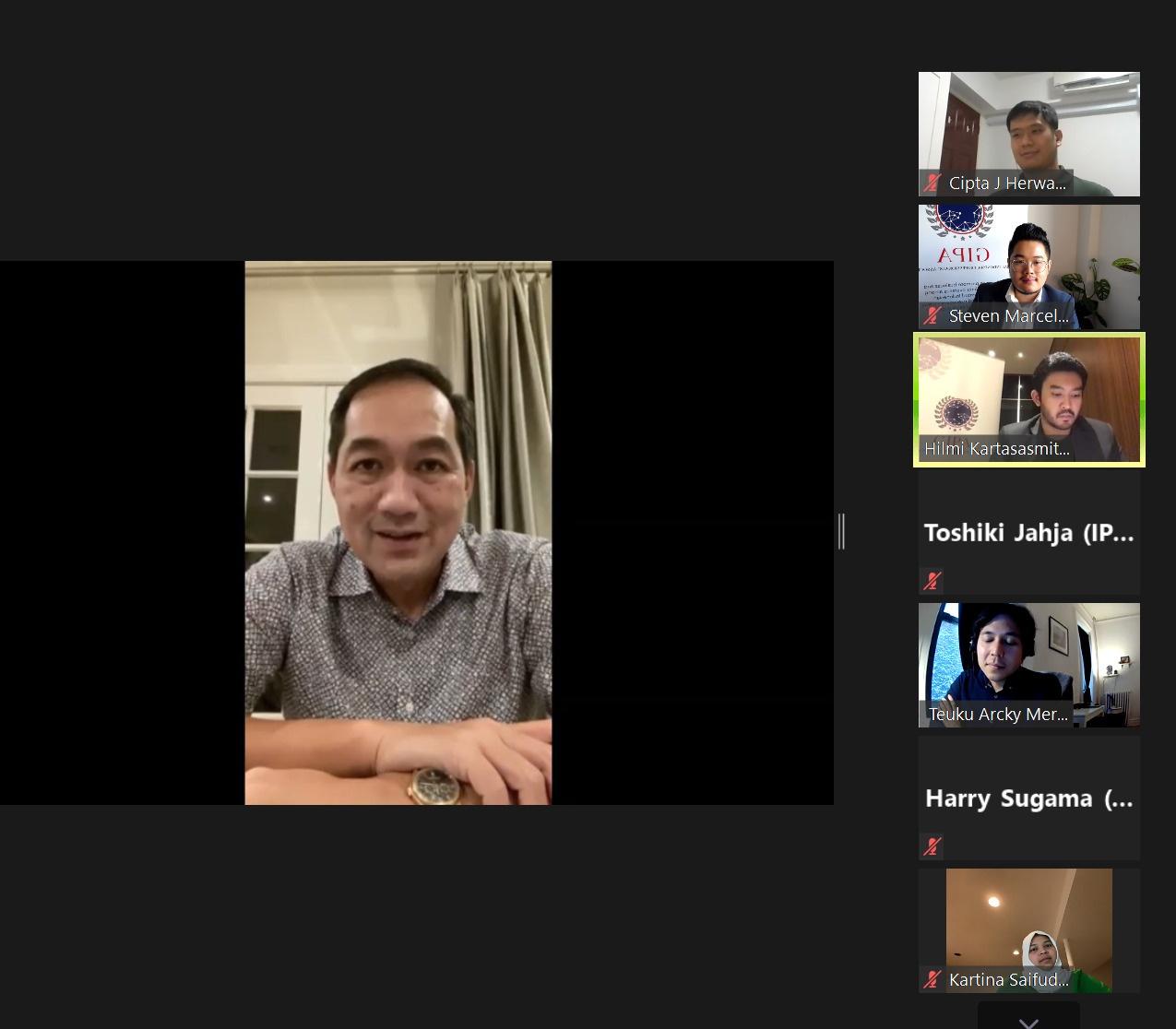

Global Indonesia Professionals’ Association (GIPA) gipa.co | council@gipa.co
Arcky Meraxa, PhD Head of Americas & Professional Development Centre of Excellence
Felicia Tanuwijoyo Digital Operations Manager
Hilmi Kartasasmita Head of Indonesia
Kevin Halim Data Science Manager
Maciko Audrey Chan Stakeholder Engagement Manager
Rachel Kindangen Digital Operations Manager
Shanen Kurniawan Data Analytics Manager
Steven Marcelino Chairman
Steven Wijaya Secretary General
Viancqa Kurniawan Centre of Excellence Manager

